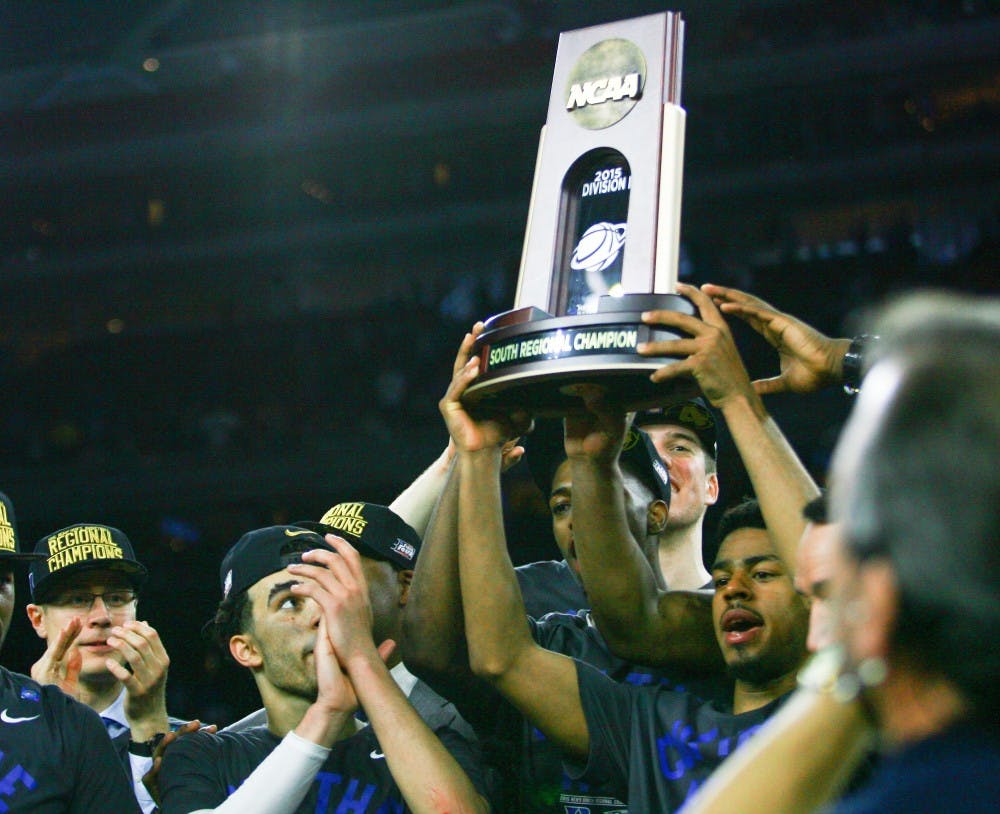HOUSTON—Teams with only eight scholarship players are not supposed to make the Final Four.
It's hard to call Duke's run to the 2015 Final Four improbable. With the amount of talent the Blue Devils boast, including ACC Player of the Year Jahlil Okafor, the top-five ranking the team has maintained all season and its No. 1 seed in the NCAA tournament's South Region, the fact that Duke is heading to Indianapolis is not inherently surprising.
But midway through the 2014-15 campaign, the Blue Devils suffered two off-court losses that most believed would hamper them heading into the postseason. First, it was the transfer of sophomore forward Semi Ojeleye to Southern Methodist in December. In the heat of ACC play, Duke shocked the college basketball world with the dismissal of junior guard Rasheed Sulaimon—the first player head coach Mike Krzyzewski has kicked off the Blue Devil team in his 35 years at the helm.
All of a sudden, the team that came into this season having nothing but depth had anything but. The Blue Devils had to rely on every single scholarship player to serve a role in the team's rotation. This meant Duke had to place an even heavier burden on its four freshmen, who were still adapting to the pace and physicality of the college game.
But right after Sulaimon's dismissal, days before the Blue Devils were slated to play undefeated No. 2 Virginia on the road, Krzyzewski gave the team a message at practice that would steady them for the rest of the season.
Eight is enough.
"We all bought in and believed," senior guard Quinn Cook said. "He's the greatest, so anything he says we believe and we trust."
Shorthanded Duke went up the road to Charlottesville, Va., and shocked the then-unbeaten Cavaliers with a late shooting barrage, taking home a 69-63 win. The Blue Devils never looked back, winning 15 of their next 16 games to earn a spot in the Final Four for the first time in five years.
This isn't to say that having a small rotation is an inherent problem. Krzyzewski is very comfortable coaching teams with a short bench in the NCAA tournament. Just nine players saw the court for Duke in the 1991 national championship game, and only eight played more than one minute. The Blue Devils played just eight players in the 1992 national championship game, seven players in the 2001 national championship game and eight in the 2010 national championship game.
But having only eight scholarship players on your roster is very different from electing to play with a short rotation. The loss of two players during the season meant that the team had no safety net should a player go down with an injury. When Okafor sprained his ankle against North Carolina Feb. 18, the Blue Devils used just seven players against Clemson.
With so little depth, the Blue Devils could barely practice. Walk-ons Nick Pagliuca and Sean Kelly and transfer Sean Obi became essential just to play five-on-five. Contact drills were no longer an option when combined with the wear and tear of a grueling season and the added injury risk. Krzyzewski said before the NCAA tournament that Duke hadn't practiced for more than an hour in the past two months.
Sulaimon's dismissal thrust freshman Grayson Allen into a spot in the rotation. Allen had played 10 minutes in a game just four times before the Blue Devils traveled to Virginia—sometimes he wouldn't see the floor for the entire game. Early in the season, Allen was Duke's most mistake-prone player, which often led to quick exits when he did see occasional minutes. Forced to play in meaningful conference game, the Jacksonville, Fla., native gained immense confidence and exploded for a career-high 27 points on Senior Night against Wake Forest.
"We have eight guys. Come on. Four of them are freshmen. It's the youngest team I've ever had," Krzyzewski said. "There's not somebody hiding in the locker room that's going to come out and appear."
With just eight scholarship players, Krzyzewski no longer had a choice about who played in games. But not only did the Duke head coach work with what he had—he made the Blue Devils' eight man rotation far tougher than the 10 players the team had to start the season.
If there's one thing Duke has proved this season, it's that strength in numbers is overrated. This team's focus and belief is what has pushed them through the adversity and on to Indianapolis.
Get The Chronicle straight to your inbox
Sign up for our weekly newsletter. Cancel at any time.

